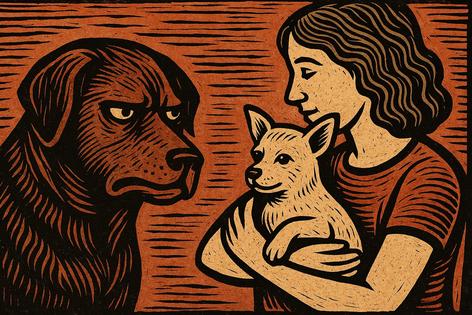Why dogs get jealous
Published in Cats & Dogs News
A jealous dog can be both endearing and frustrating. While their clingy behavior might seem cute at first, it can quickly escalate into disruptive habits that affect the harmony of your home. Dogs, like people, are emotional creatures, and jealousy is often a sign of insecurity or confusion about changes in their environment.
The most common trigger for jealousy is the introduction of someone or something new. Whether it's a baby, a new pet, a romantic partner or even a change in schedule, dogs can interpret the shift as a threat to their bond with you. This can lead to behaviors such as pushing between you and others, whining, barking, or even displaying signs of aggression or regression, such as having accidents indoors or chewing on furniture.
Dealing with a jealous dog starts with acknowledging their feelings. Punishment is not the answer and can often make the problem worse. Instead, consistency, patience and positive reinforcement are key. Make time to reassure your dog with affection and attention, but not in response to bad behavior. Reward them when they behave calmly and appropriately around the new person or pet. This teaches them that good things happen when they share your attention.
Maintaining a predictable routine can also help reduce anxiety. Dogs feel more secure when they know what to expect, so sticking to regular feeding times, walks and play sessions can offer comfort. If a new pet is involved, avoid favoritism. Spend one-on-one time with each animal, and allow them to gradually bond under supervision. In the case of a new baby or partner, involve your dog in the transition by allowing them to observe, sniff and participate calmly. Praise gentle interactions and set boundaries when needed.
In severe cases, where jealousy leads to aggressive or destructive behavior, a professional trainer or animal behaviorist may be necessary. They can assess your dog’s body language, triggers and environment to develop a plan tailored to your situation.
Ultimately, dogs act out of love and a desire to stay close to their humans. By recognizing the root of their jealousy and responding with consistency, empathy and structure, you can help your dog feel safe and valued—even when life changes.









Comments